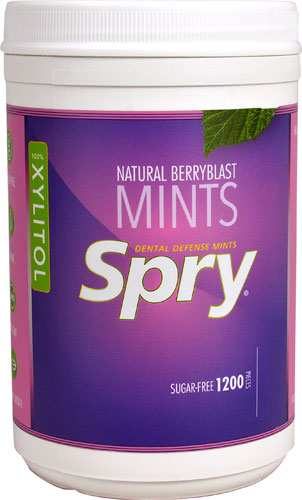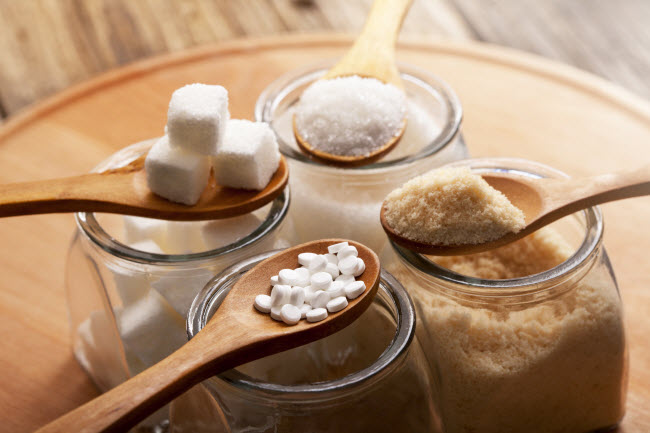Refined sugar remains high on the list of foods people are desperate to cut from their diets – and they’re wise to feel this way! Consuming too much sugar has been linked to a number of health complications and illnesses, including inflammation, obesity and even cardiovascular disease. Not to mention, sugary foods (which are often packaged/processed) tend to be high in fat and calories, while providing very little – if any – nutrition value.
Swapping the unhealthy white stuff for one of the sugar alternatives on the market today seems ideal. But with so many options available, how do you choose? Meanwhile, language on product labels – “sugar free,” “no sugar added,” “no artificial sweeteners” – can make decisions even harder. What’s someone with a sweet tooth to do?
If you’re interested in healthy sugar substitutes, this guide will help you to understand the different kinds while also helping you to avoid artificial sweeteners and refined sugar in the foods you eat.
Natural sugar alternatives
The options below are natural alternatives to sugar. In other words, they don't contain chemical ingredients, such as sucralose, aspartame or aceufulame K, commonly found in artificial sweeteners.
Stevia
A popular healthy sugar substitute, stevia comes from the stevia leaf plant, which is native to South America where it’s been used as a natural sweetener and herbal medicine for centuries. Stevia contains zero sugar, zero calories and does not impact glycemic index. Natural plant compounds in the leaves are responsible for its pleasantly sweet taste.
Stevia is a great choice if you’re diabetic or watching your sugar intake and don’t want to use anything that might affect blood sugar levels (but also don’t want to use anything artificial). Be sure to read ingredient lists to ensure purity – ideally, stevia products should contain only stevia extract (or Reb A or Rebiana, which is another name for stevia extract). Avoid products that contain fillers such as maltodextrin and sugar alcohols (such as erythritol).
Monk fruit (luo han guo)
Another plant-based option, like stevia, monk fruit is a vine-grown melon-like fruit native to China and Thailand. Its extract, available in powder form or liquid monk fruit drops, offers a sweet and pleasant mellow flavor, with zero calories, zero sugar and zero glycemic impact. Be sure to look for a pure, 100 percent monk fruit extract, as some manufacturers add corn-based fillers such as maltodextrin, which weakens the flavor and may be genetically modified.
Sugar alcohols
Sugar alcohols are a different class of sweeteners; they’re created through the process of fermentation of either corn, birch or other plant-based substances such as natural bacteria. The two most popular sugar alcohols include xylitol and erythritol. Although they’re considered “natural,” these sugar substitutes can cause digestive issues such as gas and bloating, especially when consumed regularly throughout the day. On the plus side, sugar alcohols aren't digested completely so they’re thought to have less of an impact on weight and blood sugar levels.
- Erythritol - Typically made through the fermentation of corn, this sugar alcohol offers a sweet taste and is commonly found in stevia products as a bulking and filing agent that also adds sweetness. You also might find erythritol in reduced-calorie ice creams and natural chocolates. It has hardly any impact on blood sugar levels and has only two calories per teaspoon.
- Xylitol - This sugar alcohol can be derived from birch trees or corn through a fermentation process. It’s similar to erythritol, but it seems to be slightly more tolerable for those with digestion struggles. Xylitol has zero calories per serving and doesn’t impact blood sugar levels. Another benefit of xylitol is that it’s known to support dental health by preventing cavities, so you may see it listed in natural toothpaste and other oral care products.
Other sugar alcohols you might find in packaged foods (especially sugar-free candies and bars) include maltitol and sorbitol, though they aren’t used as often as they once had been. These two sugar alcohols are typically derived from corn and may cause digestive issues just like other sugar alcohols.
Other options
Allulose, Tagatose, Lactulose and more: Generally, anything ending in “ose” is derived from some type of sugar (i.e. glucose, sucrose, fructose, lactose, galactose). These sweeteners may be derived from the fermentation of corn, cow’s milk or other sources such as bacteria. Be sure to research these ingredients before deciding to consume them. Some lack testing and may be genetically modified.
Can liquid sweeteners be healthy sugar substitutes?
While liquid sweeteners, such as honey, maple syrup, agave and coconut nectar (palm nectar) are not natural and not artificial (most are derived from plants), they are still sources of calories and sugar.
Consider molasses, a byproduct of sugar cane production, which contains all the vitamins and minerals found in sugar cane such as calcium, magnesium, iron and potassium. Molasses has the same amount of calories as sugar and is slightly higher in fructose compared to table sugar, but it’s a more natural alternative. Molasses has a distinct flavor and is mostly suitable for baking (i.e. gingerbread), although some people do enjoy it in coffee.
Of all liquid sweeteners, maple syrup and raw honey seem to be the two more welcomed in terms of taste and natural origin, although coconut nectar is gaining popularity for those concerned with glycemic index. Just keep in mind that coconut nectar isn’t nearly as sweet as white sugar so you may need more of it.
Liquid sweeteners have anywhere from 13 to 17 calories per teaspoon and 4 grams of sugar, just like regular sugar. If you want low-fructose options, maple syrup is the most popular since it’s thought to be a good source of vitamins and also more naturally processed. It may be the best choice among liquid sweeteners for those that want a lower impact on blood sugar levels.
What about unrefined sugars?
If you want to stick with "real sugar" but prefer a more natural, unrefined source, here are some options:
Evaporated cane juice - This is simply cane sugar that isn’t genetically modified and hasn’t been bleached or refined. It’s made by squeezing the juice out of sugar cane stalks and letting the water evaporate from the juice, leaving behind sugar crystals. It’s the same as refined white sugar in terms of calorie content, delivering 16 calories per teaspoon.
Turbinado sugar - Similar to evaporated cane sugar, this sugar is also made from non-GMO sugar cane stalks and isn’t refined or processed like white sugar. Sugar cane crystals are spun through a turbine, producing a brown sugar crystal that retains some of the sugar cane’s natural molasses in the final product. Turbinado sugar has the same calorie content and grams of sugar per teaspoon of regular sugar (16 calories and 4 grams, respectively).
Natural cane sugar/raw cane sugar - Also similar to evaporated cane sugar, raw cane sugar is also non-GMO sugar cane that has been only slightly processed to produce sugar crystals from sugar cane naturally. It also has the same calorie content and grams of sugar as regular sugar, containing 4 grams of sugar and 16 calories per teaspoon.
Coconut sugar/palm sugar - This granulated sugar doesn’t come from sugar cane stalks but instead from coconut sap derived from coconut palm trees. It has a dark color and a caramel-like, slightly burnt flavor that works well in baked goods. Many enjoy it as a replacement to white sugar even though it tastes very different. You can use palm sugar as a one-to-one replacement for sugar since it’s granulated. Coconut sugar has the same calorie content and grams of sugar as regular sugar cane, so just use it moderately as you would any other sugar.




